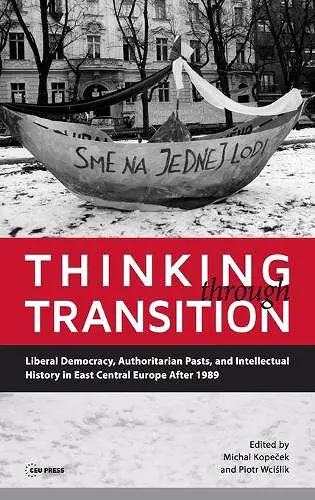Thinking through Transition
Liberal Democracy, Authoritarian Pasts, and Intellectual History in East Central Europe After 1989
Michal Kopecek editor Piotr Wcislik editor
Format:Hardback
Publisher:Central European University Press
Published:1st Oct '15
Currently unavailable, and unfortunately no date known when it will be back

This is the most comprehensive and balanced intellectual history so far available of post-communist East Central Europe. It offers a systematic approach to the understanding of the Great Transformation of the last quarter of a century: the remapping of the political landscape of East-Central Europe through an intellectual history of the post-1989 era.
"It is not easy for historians to apply their methods to a period that does not yet have a clear end" is the first sentence in this book, revealing the challenge that a new generation of scholars took at writing an intellectual history of post-communist East Central Europe.Thinking through Transition is the first concentrated effort to explore the most recent chapter of East Central European past from the perspective of intellectual history. Post-communism can be understood as a period of scarcity and preponderance of ideas, the dramatic eclipsing of the dissident legacy (as well as the older political traditions), and the rise of technocratic and post-political governance. This book, grounded in empirical research sensitive to local contexts, proposes instead a history of adaptations, entanglements, and unintended consequences. In order to enable and invite comparison, the volume is structured around major domains of political thought, some of them generic (liberalism, conservatism, the Left), others (populism and politics of history) deemed typical for post-socialism. However, as shown by the authors, the generic often turns out to be heavily dependent on its immediate setting, and the typical resonates with processes that are anything but vernacular.
"Based on the richness and merits of the volume, the readers are invited to discover that Thinking through Transition is not 'just another' book on an old topic, but essential reading for those who wish to understand the period in question. Furthermore, the novelty of the approach and the scholarly - and also public - usefulness of such a collective effort give ground to the hope that this volume is the first attempt in a series of historical reflections on our recent past and troubled present." * Visegrad Insight *
"There is, Kopeček and Wciślik argue, space for a ‘possible future intellectual history’ of East and Central Europe examining ‘the transfer and circulation of ideas from a bottom-up perspective’, focusing on specific contexts but retaining a broad sense of regional commonalities. It is this goal that their collection sets out to address. Thinking through Transition assembles a set of readable and engaging case studies which underline the need for historical and comparative perspectives based on well-grounded research which take debates in the region as its point of departure." * Slavonic and East European Review *
"The edited volume assembled by Michal Kopeček and Piotr Wciślik offers a novel and refreshing take on the history of the political transformations of East Central Europe in the post-communist era, a field that has been long and eminently dominated by the normative and often a historical prescripts of “transitology” scholarship (and business). Though 1989 functions as the springboard of narration, several essays trace and connect discourses back to earlier intellectual genealogies; they demonstrate how both past intellectual standpoints and present concerns provided the particular ideological admixture and the choice of positionality in the present, drawing upon an arsenal of actual or fictitious continuities, discontinuities, and/or reconfigurations of political discourse, a circumstance perhaps best exemplified in the transformations of '1989' itself: from an initial symbol of consensual politics to a floating signifier and, eventually, a convenient moment of contestation in order to redraw the lines of the political. Moreover, this volume exemplifies the fact that intellectual history is not only about the life-cycle of ideas but also about the performativity of the political, in other words, the capacity of actors to occupy timely key political/ideological spaces in relation to their political opponents and therefore not only to define the political agenda but also to capture public space and social imagination. Thinking through Transition is certainly a brave and important step in the right direction." * Hungarian Historical Review *
"The approach taken in this monograph differs from that of traditional ‘transitology research’. It uncovers the rich intellectual landscape of post-1989 Eastern and Central Europe and offers an insider’s view to understanding the transformations, their origins, dynamics and consequences. Emphasis is placed on the conceptual foundations, trajectories and implications of intellectual history. The strong point of the book is that it tries to create a critical distance from the ‘transition period’ and ‘post-socialism era’, the conventional approaches in post-1989 ECE research. The authors impose on themselves exploratory objectives of analysis, their intention being to provoke scholarly debate and further investigation. This publication brings us closer to the historicity of the post-1989 period in ECE. The intellectual history of post-socialism contributes to a better understanding of the key political ideas developing and evolving in the post-socialist period. The book demonstrates sensitivity to regional dynamism and it brings exploratory value to the field." * Europe-Asia Studies *
ISBN: 9789633860854
Dimensions: unknown
Weight: unknown
608 pages